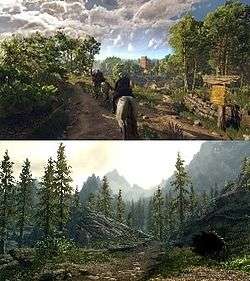REDengine
 | |
| Original author(s) |
Tomek Wójcik Bartek Wroński Balázs Török |
|---|---|
| Developer(s) | CD Projekt RED |
| Development status | Active |
| Platform | Microsoft Windows, OS X, Linux, Xbox 360, Xbox One, PlayStation 4 |
| Type | Game engine |
| Website |
cdpred |
REDengine is a game engine developed independently by CD Projekt RED.[1] It was designed exclusively for CD Projekt RED's nonlinear, role-playing video games.
Features
REDengine is portable across 32- and 64-bit software platforms and runs under Microsoft Windows.[1] REDengine was first used in The Witcher 2: Assassins of Kings for Microsoft Windows.[2] REDengine 2, an updated version of REDengine used in The Witcher 2,[1] also runs under Xbox 360[3] and both OS X[4] and Linux, however these ports were made using a compatibility layer similar to Wine called eON. REDengine 3 was designed exclusively for a 64-bit software platform, and also runs under PlayStation 4[5] and Xbox One.
Versions

REDengine 2
REDengine 2 utilized middleware such as Havok for physics, Scaleform GFx for the user interface, and FMOD for audio.[6] The engine was used for the Xbox 360 port of The Witcher 2.[7]
REDengine 3
REDengine 3 was designed to run exclusively on a 64-bit software platform, CD Projekt RED created REDengine 3 for the purpose of developing open world[1] video game environments, such as those of The Witcher 3: Wild Hunt.
It introduces improvements to facial and other animations.[1] Lighting effects no longer suffer from reduced contrast ratio.[1] REDengine 3 also supports volumetric effects enabling advanced rendering of clouds, mist, fog, smoke, and other particle effects. There is also support for high resolution textures and mapping, as well as dynamic physics and an advanced dialogue lip syncing system. However, due to limitations on texture streaming, use of high resolution textures may not always be the case.
REDengine 3 has a flexible renderer prepared for deferred or forward+ rendering pipelines.[1] The result is a wide array of cinematic effects, including bokeh depth-of-view, color grading and lens flares associated with multiple lighting.[1]
The terrain system in REDengine 3 uses tessellation and layers varying material, which can then be easily blended.[1]
REDengine 4
In 2017, CD Projekt revealed that they had four projects in development and that they will run from 01/2016 and 01/2017 until 06/2019. All of the projects will be included in RedEngine 4, the next iteration of the RedEngine.[8]
Games using REDengine
| Title | Year | Platform(s) |
|---|---|---|
| REDengine 1 | ||
| The Witcher 2: Assassins of Kings | 2011 | Microsoft Windows, OS X |
| REDengine 2 | ||
| The Witcher 2: Assassins of Kings Enhanced Edition | 2012 | Microsoft Windows, Xbox 360, OS X, Linux |
| REDengine 3 | ||
| The Witcher 3: Wild Hunt | 2015 | Microsoft Windows, PlayStation 4, Xbox One |
| REDengine 4 | ||
| Cyberpunk 2077 | TBA | Microsoft Windows, PlayStation 4, Xbox One |
References
- 1 2 3 4 5 6 7 8 9 10 "CDPRED: "RED Engine 3 is a revolution in RPGs"". IGN Entertainment, Inc. 1 February 2013. Retrieved 25 March 2013.
- ↑ O'Connor, Alice (10 November 2010). "The Witcher 2 Dev Diary Introduces New Engine". Shacknews. Retrieved 4 June 2011.
- ↑ Peckham, Matt (25 March 2010). "The Witcher 2 Announced, 'Non-Linear' with 'Smoother' Combat". PCWorld. Retrieved 4 June 2011.
- ↑ "The Witcher 2 Is Coming To Mac". Forbes. 30 May 2012. Retrieved 15 August 2012.
- ↑ Yin-Poole, Wesley (21 February 2013). "The Witcher 3: Wild Hunt confirmed for PlayStation 4 in 2014". Eurogamer.net. Retrieved 22 February 2013.
- ↑ Leadbetter, Richard (24 January 2016). "The Making of The Witcher 2". Eurogamer. Retrieved 7 June 2016.
- ↑ Hinkle, David (1 February 2013). "CD Projekt Red introduces REDengine 3, latest iteration of in-house tech". Engadget. Retrieved 7 June 2016.
- ↑ Morris, Tatiana (22 March 2017). "New Cyberpunk 2077 details suggest mid-2019 release". GameZone. GameZone Next.